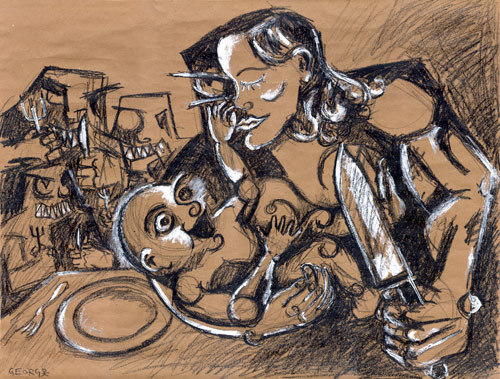LAUGHTER THAT KILLS
In 1729 Jonathan Swift wrote “A Modest Proposal” in which he suggested the Irish poor might ease their penury by selling their children as food to satisfy the refined tastes of wealthy Lords and Ladies. His purpose was to satirize the heartless attitude the rich showed toward the lower classes. In particular, he took aim at their claim that they had no responsibility to alleviate poverty as the poor were poor because they were lazy. And so Swift provided his compromise:
“A healthy child well nourished, is at a year old, a most delicious and nourishing wholesome food whether stewed, roasted, baked or boiled…”

(Georg Pedersen)
Readers unaccustomed at the time to Swift’s jests were outraged — as well they should have been — though one could argue that by butchering children of poverty at an early age, one spared them the evils of starvation and crippling diseases — diseases that, with a little medical care, could have been avoided.
Of course, in the twenty-first century created a kinder and gentler world and would never be taken in by Swift’s humor. We would recognize his plot at once. As proof of my assertion, I cite an incident from the Tea Party’s Republican Presidential Debate this week. During the question and answer period, one candidate was asked about health care: “If a 30-year old man without health insurance were to fall into a comma should society pay for his treatment?” The candidate, who is a doctor, replied that the man had decided his fate by choosing not to have medical coverage.
Not satisfied with the answer, the moderator pressed him further. Yes or no, should the man without health insurance be allowed to die? Before the candidate could reply, the audience broke into a cheerful round of applause to suggest that he should.
Of course, I wasn’t fooled by their laughter. Like Swift, they were engaging in satire, surely. I turned off the TV, happy in the knowledge that in the twenty-first century, we had become so humane.